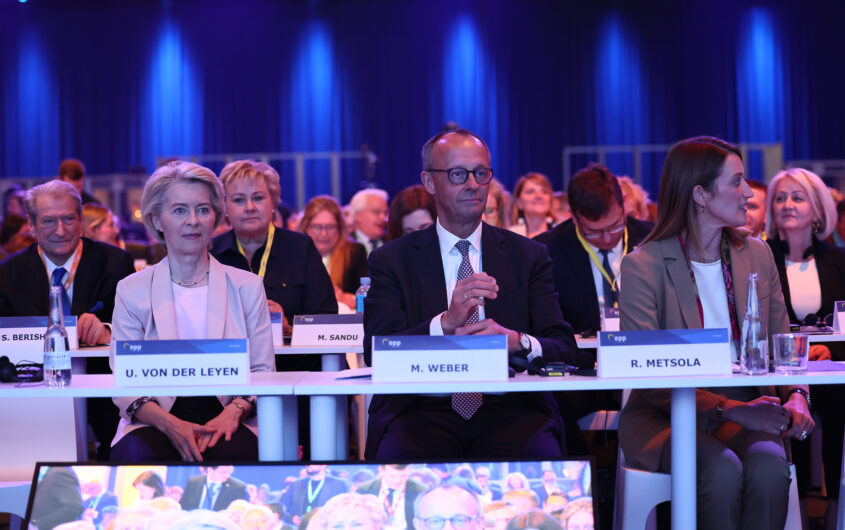
European People's Party via Flickr
The Schuman Plan at 75 and the EU’s Global Role

Peter S. Rashish
Vice President; Director, Geoeconomics Program
Peter S. Rashish, who counts over 30 years of experience counseling corporations, think tanks, foundations, and international organizations on transatlantic trade and economic strategy, is Vice President and Director of the Geoeconomics Program at AICGS. He also writes The Wider Atlantic blog.
Mr. Rashish has served as Vice President for Europe and Eurasia at the U.S. Chamber of Commerce, where he spearheaded the Chamber’s advocacy ahead of the launch of the Transatlantic Trade and Investment Partnership. Previously, Mr. Rashish was a Senior Advisor for Europe at McLarty Associates, Executive Vice President of the European Institute, and a staff member and consultant at the International Energy Agency, the World Bank, UN Trade and Development, the Atlantic Council, the Bertelsmann Foundation, and the German Marshall Fund.
Mr. Rashish has testified before the House Financial Services Subcommittee on International Monetary Policy and Trade and the House Foreign Affairs Subcommittee on Europe and Eurasia and has advised three U.S. presidential campaigns. He has been a featured speaker at the Munich Security Conference, the Aspen Ideas Festival, and the European Forum Alpbach and is a member of the Board of Directors of the Jean Monnet Institute in Paris and a Senior Advisor to the European Policy Centre in Brussels. His commentaries have been published in The New York Times, the Financial Times, The Wall Street Journal, Foreign Policy, and The National Interest, and he has appeared on PBS, CNBC, CNN, NPR, and the BBC.
He earned a BA from Harvard College and an MPhil in international relations from Oxford University. He speaks French, German, Italian, and Spanish.
On May 9, the European Union marked the seventy-fifth anniversary of the Schuman Plan, the project to create a European Coal and Steel Community (ECSC) among six countries that was named for Robert Schuman, the French Foreign Minister at the time. While Schuman was the public face of the idea and provided its political leadership, much of the inspiration and planning came from Jean Monnet, the head of the French planning agency who would later become the ECSC’s first president.
This date, which has become known around the world as “Europe Day,” commemorates the first steps toward European integration as a peace project. After two destructive world wars in a half century, the coal and steel community would make conflict impossible in Europe by creating a common framework for the production and trade of these two key elements of war making. In 2025, there is war in Europe again since Russia’s invasion of Ukraine more than three years ago, but not among the twenty-seven countries of the European Union that are the inheritors of Schuman’s and Monnet’s vision.
History does not repeat itself, so the world that Germany, France, Italy, Poland, Spain, and the other EU member states face today is thankfully not one recovering from recent conflict on a global scale. But like the post-World War II period, the current (still unnamed) era is already sending the clear message that new strategies, agreements, and even institutions are needed to meet the challenges of a global economic environment in flux. Or, if not entirely new ones, then at least reform of those that exist now. And that includes the European Union.
Reducing barriers and deepening integration would make the EU better placed to exert leadership as a more plurilateral form of global economic order emerges.
As it turns out, the EU can not only look back at the launch in 1950 of the coal and steel community but also at new ideas already on the shelf for building blocks of a renewed European approach that respond to today’s more disorderly global economy.
Within the last year or so, Enrico Letta, Italian Prime Minister in 2013-2014, and Mario Draghi, the former President of the European Central Bank, have produced two reports—one on the EU single market, the other on EU competitiveness—that provide the foundations for a more prosperous Europe domestically and a more resilient one internationally.
By reducing barriers to economic activity and deepening integration in areas like capital markets, energy, and defense, the EU would become a more attractive place for investment and start-up funding. Combined with trade policy tools it has developed over the last few years, these reforms would also make the EU better placed to exert leadership as a more plurilateral form of global economic order emerges.
The role of the EU member states—especially (but not only) France and Germany, the two traditional drivers of integration—will be crucial. With new Chancellor Friedrich Merz leading a coalition among the center-right CDU, its Bavarian sister party the CSU, and the center-left SPD, Germany has the opportunity to engage more effectively on EU issues.
Earlier in his career, Merz served as a Member of the European Parliament and is in the tradition of former CDU Chancellor Helmut Kohl who helped create the euro. In addition, Merz has already shown at the national level that he understands the urgency of reform by pushing through very large new investments in defense and infrastructure that break with Germany’s austere fiscal tradition. Germany is thinking and acting more strategically about its international economic position and can help the EU to do the same.








